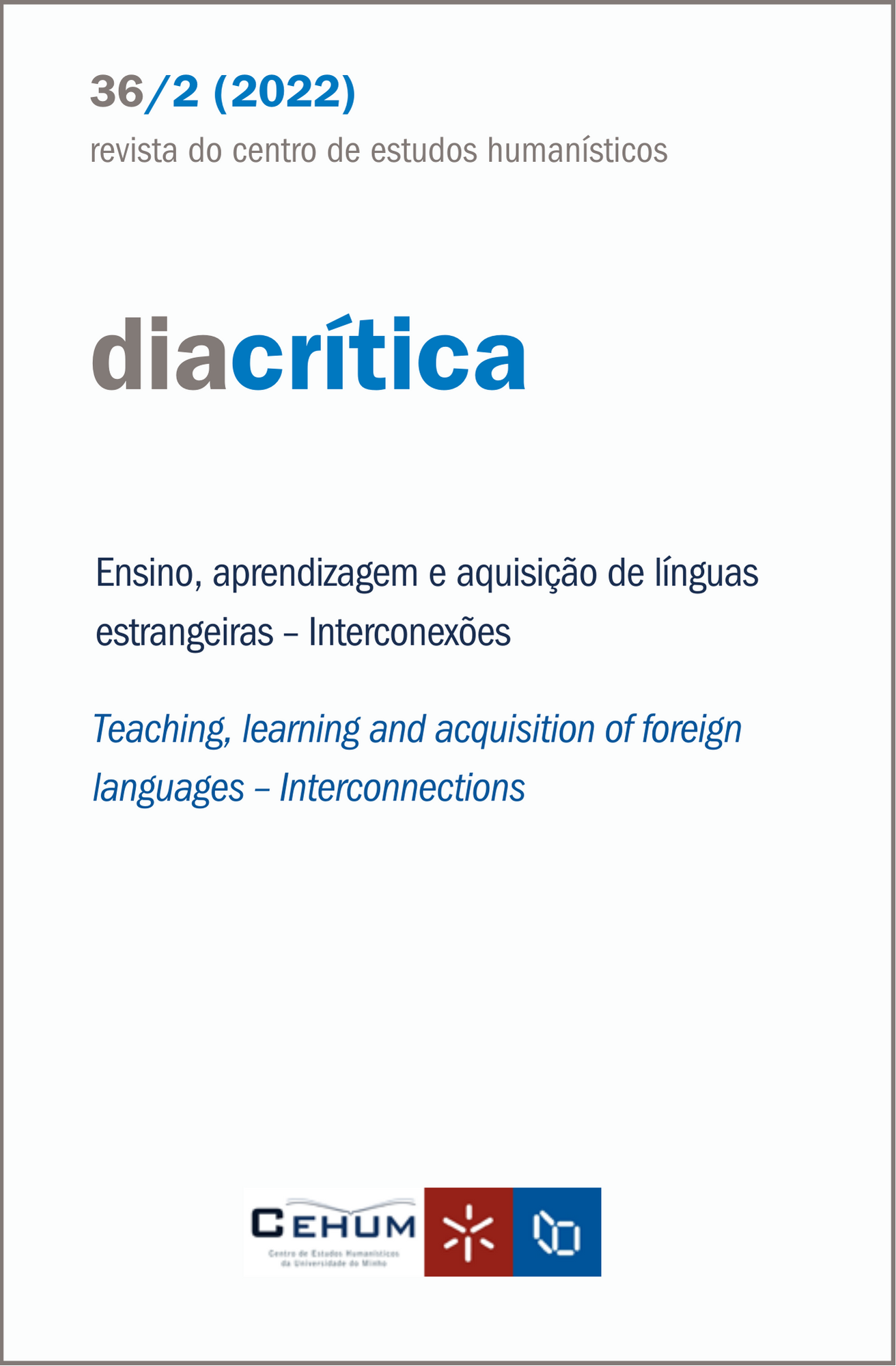Role of mother tongue on phraseologism in PLE.A study with Chinese learners
DOI:
https://doi.org/10.21814/diacritica.4811Keywords:
Phraseology, Portuguese as Foreign Language, Chinese Students, Acquisition, Mother TongueAbstract
Phraseology studies phrases or expressions crystallized by usage, which were created to respond to communicative needs. Although there seems to be a decrease in their use, what is certain is that they still survive and, as such, pose some difficulties to Portuguese as a Foreign Language (PLE) students due to their non-linear character. The present work seeks to discuss the role of mother tongue on the acquisition of these expressions by Portuguese as a Foreign Language students, analyzing, based on data collected in a previous research work, the existence of analogous expressions in the mother tongue, the frequency of use, study time, influence knowledge.
References
Brown, H. D. (1980). Principles of language learning and teaching. Prentice-Hall Regents.
Burger, H. (1998). Phraseologie. Eine Einführung am Beispiel des Deutschen. Erich Schmidt Verlag.
Burger, H., Buhofer, A., & Sialm, A. (Eds.). (1982). Handbuch der Phraseologie. de Gruyter. DOI: https://doi.org/10.1515/9783110849394
Dobrovol'skij, D., & Piirainen, E. (2005). Figurative language. Cross-cultural and cross-linguistic perspectives. Elsevier.
Firth, J. (1957). Papers in linguistics 1935-51. Oxford University Press.
Gagné, C., Spalding, T., & Nisbet, K. (2016). Processing English compounds: investigating semantic transparency. SKASE Journal of Theoretical Linguistics, 13(2), 2–22.
Gaston, G. (2000). Les expressions figées en français. Noms composés et autres locutions. Editions Ophrys.
Lakoff, G., & Johnson, M. (1980) Metaphors we live by. University of Chicago Press.
Libben, G. (1998). Semantic transparency in the processing of compounds: consequences for representation, processing, and impairment. Brain and Language, 61(1), 30–44. https://doi.org/10.1006/brln.1997.1876 DOI: https://doi.org/10.1006/brln.1997.1876
Mel'chuk, I. (1995). Phrasemes in language and phraseology in linguistics. In M. Everaert, E-J. van der Linden, A. Schenk & R. Schreuder (Eds.), Idioms: structural and psychological perspectives. Psychology Press
Kellerman, E. (1987). Aspects of transferability in second language acquisition [Tese de mestrado, University of Nijmegen]. Radboud Repository. https://repository.ubn.ru.nl/ handle/2066/113363
Rente, S. (2013). Expressões idiomáticas ilustradas. LIDEL.
Rio-Torto, G. (2012). Lexical idiomaticity and word processing. In A. Fabregas, E. Feliu, J. Martiu & J. Pazó (Eds.), Los limites de la morfologia. Estudios ofrecidos a Soledad Varela Ortega (pp. 397–412). Universidad Autónoma de Madrid. https://doi.org/ 10.15366/l.morfologia2012.024 DOI: https://doi.org/10.15366/l.morfologia2012.024
Ruixi, L. (2021). Aquisição de expressões fraseológicas em PLE (Português Língua Estrangeira): dificuldades dos aprendentes chineses [Tese de mestrado, Universidade de Aveiro]. Repositório Institucional da Universidade de Aveiro. http://hdl.handle.net/10773/32819
Selinker, L. (1972). Interlanguage. IRAL: International Review of Applied Linguistics in Language Teaching, 10(3), 209–231. DOI: https://doi.org/10.1515/iral.1972.10.1-4.209
Seuren, P., & Wekker, H. (1986). Semantic transparency as a factor in Creole Genesis. In P. Muysken & N. Smith (Eds.), Substrata Versus Universals in Creole Genesis (pp. 57–70). John Benjamins. https://doi.org/10.1075/cll.1.05seu DOI: https://doi.org/10.1075/cll.1.05seu
Silva, D. (2002). A vida íntima das palavras- origem e curiosidade da língua portuguesa. Editora Arx.
Sinclair, J. (Ed.). (1991). Corpus, concordance, collocation. Oxford University Press.
Vilela, M. (2002). As expressões idiomáticas na língua e no discurso. In Actas do Encontro Comemorativo dos 25 anos do Centro de Linguística da Universidade do Porto (Vol. 2, pp. 159–189). Universidade do Porto.
Downloads
Published
How to Cite
Issue
Section
License
Copyright (c) 2023 Sara Pita, Liu Ruixi

This work is licensed under a Creative Commons Attribution-NonCommercial 4.0 International License.










